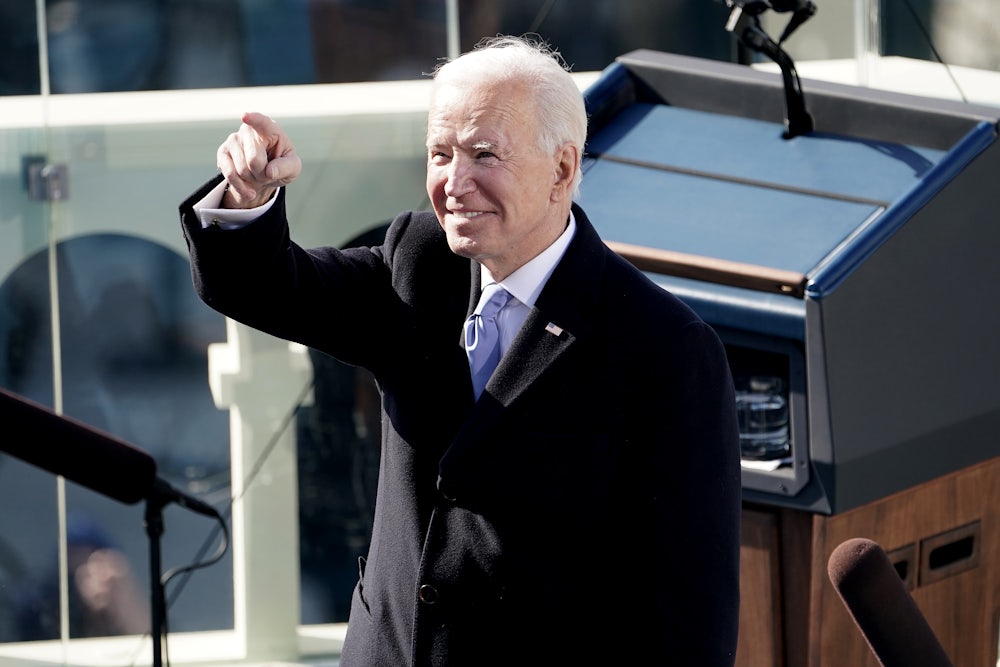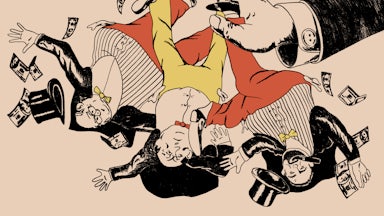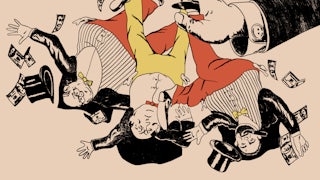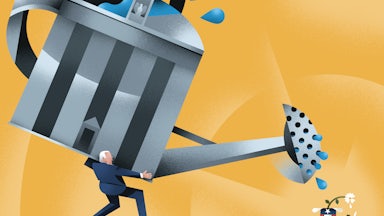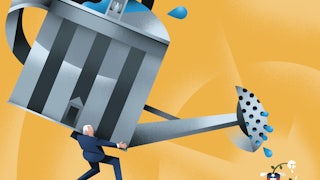Joe Biden’s inaugural speech was primarily about unity, an appropriate theme after the pathologically divisive presidency of you-know-who. But Biden also reaffirmed that government can address the nation’s problems effectively—a theme that, at least implicitly, repudiates the legacy of a much earlier predecessor who, inexplicably, became the most admired president of the past half-century.
Ronald Reagan was sworn into office exactly 40 years before Biden, on January 20, 1981. It was my first day on the job as a staff writer for The New Republic, and I have two memories.
The first was that Michael Kinsley, the editor, asked me in a low voice as he was leaving to provide any necessary assistance to a more senior new hire, a wheelchair-bound former speechwriter for Vice President Walter Mondale named Charles Krauthammer. (Mike didn’t feel certain Charles could open the front door, but he managed fine on his own and went on to evolve, before his untimely death in 2018, from liberal anti-Communist to movement conservative.)
My other memory of that day is a single line from Reagan’s inaugural speech as I watched it on a small TV in the office of Dorothy Wickenden, then the magazine’s production chief and soon to be its managing editor. (I don’t remember where Dorothy was.)
The speech was mostly unexceptional, much of it memorable only in ironic retrospect. It wasn’t, for instance, especially novel to hear a new president say, “For decades we have piled deficit upon deficit, mortgaging our future and our children’s future for the temporary convenience of the present.” That was a familiar enough platitude. What I couldn’t know was that President Reagan would expand the budget deficit from $74 billion to $155 billion and that, two decades later, Vice President Dick Cheney would tell Treasury Secretary Paul O’Neill, “Reagan taught us deficits don’t matter.” (Except, of course, if that president is a Democrat.)
The line that caught my attention as I listened with half an ear while working on some other assignment was the same line everybody remembers from that speech. “In the present crisis,” Reagan said, “government is not the solution to our problem; government is the problem.” Here, Reagan was actually saying something. As a New Deal liberal who’d voted for Jimmy Carter, I knew it meant trouble, and so it proved to be.
Reagan’s war on government was more talk than action. As Kinsley would observe in 2001, on the occasion of Reagan’s ninetieth birthday, federal spending was, after inflation, one-quarter higher when Reagan left office than when he entered it, and the federal civilian workforce expanded from 2.8 million to three million. What Reagan did was reduce taxes, principally on the rich, as a share of gross domestic product. Presidents George W. Bush and Donald Trump followed Reagan’s example, spouting anti-government rhetoric to justify tax cuts for the rich but not following through with significant spending cuts.
The theory for tax cuts as a means to shrink government was “starve the beast”: Deprive the federal government of revenue, and spending cuts would have to follow. But that didn’t happen; government spending continued to go up. Reviewing tax and spending patterns over the 20 years that followed Reagan’s election, the late libertarian economist William Niskanen concluded that tax cuts, far from compelling spending cuts, accelerated government spending by reducing its cost to the taxpayer. As with pencils or automobiles or anything else, the way to sell more government was to lower its cost.
Even though Reagan’s disparagement of government failed to shrink its size, it did plenty of long-term damage. The tax cuts enacted to wage war on big government accelerated the trend toward income inequality without doing much to create economic growth. (A recent study by two economists at the London School of Economics reached the same conclusion about tax cuts enacted over the past five decades in other countries belonging to the Organization for Economic Cooperation and Development.) Growth in income inequality, in turn, fueled tribal disaffection among the white working class, which the GOP successfully exploited in presidential politics.
The war on government also made it possible to reduce nondefense domestic discretionary spending—that is, all government spending except defense spending and “nondiscretionary” entitlement programs like Social Security and Medicare, where anybody who’s eligible receives benefits automatically. Non-defense domestic nondiscretionary spending represents only about 14 percent of all federal spending, which is why shrinking it has no appreciable effect on overall government spending.* But conservative politicians like to cut it anyway, because such cuts help make “government is the problem” a self-fulfilling prophecy. An especially high priority has been to cripple the ability of regulatory agencies like the Environmental Protection Agency and the Labor Department to police business violations of environmental law, labor law, and other protections.
Under Reagan, nondefense domestic discretionary spending fell from more than 5 percent of GDP to less than 3.5 percent, according to the Center for Budget and Policy Priorities, a Washington think tank. After that, it never cracked 4 percent, except briefly during the early part of Barack Obama’s presidency. Under Trump, it sank lower than it’s been since John F. Kennedy was president.
Another victim of Reagan’s anti-government rhetoric was regulation, which was hampered not only by cuts to nondefense domestic discretionary spending but also by the imposition of more direct obstacles. After Republicans regained the House of Representatives in 1994, Congress passed a law requiring that all major regulations be subjected to a cost-benefit analysis, a reasonable-sounding proposition often abused to minimize potential benefits to the public and maximize potential costs to business. (Estimates of compliance costs nearly always turned out to be much higher than what businesses ended up spending in the real world.) Giving lip service to health and safety regulations, Trump waged overt war against the regulatory process, rolling back no fewer than 100 environmental rules and bottling up many more.
Reagan’s assertion that “government is the problem” was so great a rhetorical success that even Democrats felt powerless to challenge it. In his 1996 State of the Union address, President Bill Clinton echoed Reagan by saying “the era of big government is over” and boasted that he was already creating a “new, smaller government.” Even Obama felt compelled to say, in his 2013 State of the Union address, “It is not a bigger government we need, but a smarter government”—even though it was plainly evident that government wouldn’t likely get much smarter until nondefense spending was permitted to increase. (In a more frank vein, Obama would tell Ta-Nehisi Coates in 2016 that if you had no problem with government spending before it was made available to bring African Americans and Latinos into the middle class, then you “have to ask yourself the question of how consistent you are, and what’s different, and what’s changed.”)
Trump’s presidency has been described by many conservatives as a repudiation of Reagan’s movement conservatism, and in many ways it was. Certainly, Reagan would have deplored Trump’s vulgarity and incivility, and rejected Trump’s policy views on immigration and trade. But Trump embraced more wholeheartedly than any other president Reagan’s dictum that “government is the problem.”
Trump’s very candidacy was based on the proposition that anyone with experience in politics was unfit to be president. He raged continually against government, stating repeatedly that it was bloated when in fact civilian employment stood about where it was in the mid-1960s. He waged his war against regulation. He left key government posts unfilled, even in the few agencies he cared about, like the Department of Homeland Security, where only about one-third of the top positions were filled with permanent appointees. He presided over the highest turnover of senior-level advisers in at least 40 years.
Trump inveighed against the “deep state,” which sometimes meant the civil service and sometimes meant political appointees to whom he’d taken a dislike. He hurled insults continually at his Cabinet appointees on Twitter, as if they belonged to someone else’s government. When he lost the 2020 election, he disputed the results, dismissed the many court rulings that upheld those results, and in the end waged war on his own vice president for not throwing out electoral ballots. Finally, he incited an insurrection against Congress and refused for hours to tell rioters who were committing acts of deadly violence and vandalism to go home. You can’t get any more anti-government than that.
In calling for unity Wednesday, Biden was in effect saying, enough—not only with treasonous insurrection but also with the identification of government as the enemy. He didn’t say, “I’m for big government, and I’m going to make it bigger.” But he did say this: “We can right wrongs. We can put people to work in good jobs. We can teach our children in safe schools. We can overcome the deadly virus. We can reward work and rebuild the middle class and make health care secure for all. We can deliver racial justice and we can make America once again the leading force for good in the world.”
Biden didn’t say that the federal government can do these things, but that’s what he meant. He’s got an ambitious agenda to stimulate the economy and distribute vaccines and address the climate change crisis. These are all actions that will be undertaken by the same federal government that Ronald Reagan said was not the solution to America’s problems, but the problem itself. With a little luck, Biden will finally put such poisonous rhetoric to rest.
* This article originally characterized this as domestic nondiscretionary spending.
